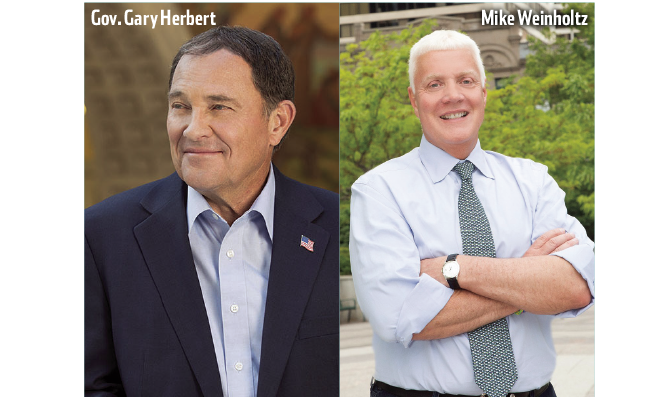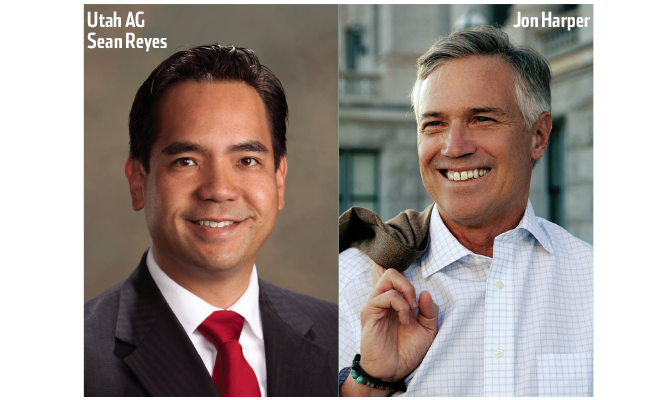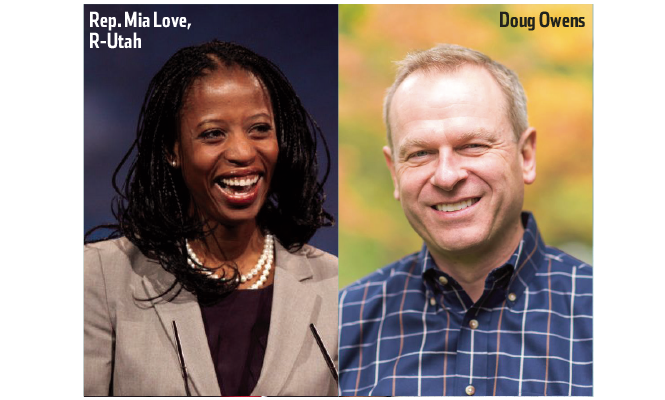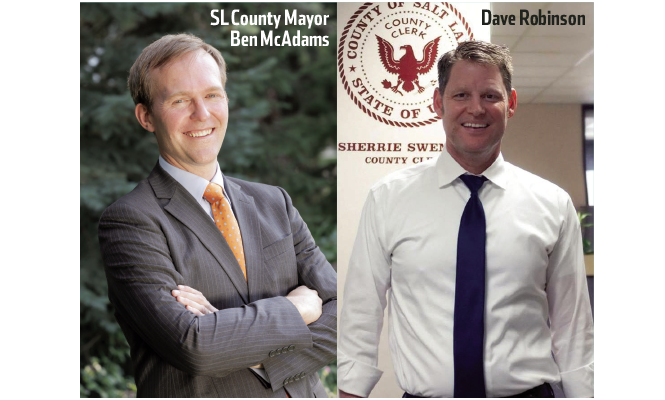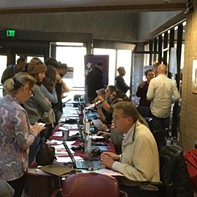Page 4 of 4
Binging on your kid's Halloween stash is risk-free—even the bad candy is pretty good. Politicians, on the other hand, should be scrutinized before selection. Here is a primer for several ballot races.
GOVERNOR
Times were bleaker in 2009 when Gov. Gary Herbert was handed the keys to Utah's top executive office. Toward the end of the Great Recession, amid stagnant economic growth and shrunk budgets, then-Gov. Jon Huntsman Jr. headed off to Beijing to serve as the American ambassador. Herbert stepped in to fill his shoes while Utah, like most of the country, was still reeling. Weakened but not broken, the economy slowly rebounded. All was well.
But in the eyes of some, Utah's downtrodden are being whitewashed by the prosperous sheen. The gubernatorial candidates paint two competing pictures of the state. Voters will decide at the ballot box whether they agree more with Herbert's sunny vision or Democratic challenger Mike Weinholtz' darker one.
Governors can play highly influential roles in state policy, both as leaders but also as the ones wielding the pen that signs into law or vetoes any measure passed by the Legislature. The winner of this election can push vastly different agendas.
The state's prosperity is a sign, Herbert argues, that his strategies work. These days, Herbert holds up Utah's business-friendly environment as a coveted gem that has lured companies to open shop in the Beehive State. And while the governor acknowledges room for improvement, he emphasizes that an imperfect state shouldn't be confused with one that isn't progressing.
"We ought to be humbled, and we ought to be grateful for the great successes we are having," he told a debate audience recently at Utah State University. "The data doesn't lie," Herbert continued, insisting that fostering a pro-business atmosphere has expanded the tax base and allowed the state to invest $1 billion into education.
Weinholtz, however, argues that Herbert's rosy outlook is a stunning example of how out-of-touch the governor is with everyday Utahns. Weinholtz lists his opponent's failings: toxic air, crammed classrooms and hundreds of thousands left uninsured. These unresolved problems, he says, indicate the governor is ignoring an enormous chunk of the populus.
"What I'm hearing over and over again is that people feel they don't have a voice. If you're not a big corporation that can write a big campaign check or afford an expensive lobbyist, that your voice is not heard on Capitol Hill," Weinholtz tells City Weekly. "I'm running to give all those people who don't have a lobbyist a voice."
Herbert says education is his No. 1 priority. Weinholtz calls that claim lip service: The state, he reasons, isn't funding education at pre-recession levels, and Utah remains dead last in the nation in per-pupil spending.
Herbert asked voters to evaluate Utah's education system by its results, pointing to climbing graduation rates and test scores. Eighth-graders, for example, ranked 16 in average math scores and 10 in reading, according to a National Center for Educational Statistics 2015 report.
"The outcomes we're getting in our state are actually very good; our teachers are doing great things, our principals, our local school boards members, our superintendents," he said. "All those stakeholders go to getting a good education."
Weinholtz hammered the state for declining federal dollars for Medicaid expansion, calling it morally bankrupt and fiscally irresponsible. Herbert says his proposed alternative, Healthy Utah, would have closed the coverage gap, but that measure didn't make it through the Legislature.
Both candidates support a federal reclassification of marijuana, currently a Schedule 1 drug lumped with other narcotics deemed to have no medical use, such as heroin. Their stances on medical marijuana differ, however. Weinholtz, whose wife was under investigation for using marijuana to alleviate arthritis pain, says lawmakers should have passed a medical cannabis bill last session. Herbert is more tepid: He says the medicinal properties need to be studied further to test whether research confirms anecdotal evidence. Weinholtz agrees that recreational pot is "a step too far for Utah."
Herbert supports transferring federal land to the state in order to facilitate more grazing and energy extraction. Weinholtz claims the state would sell parcels of the land, thereby cutting off access to those who enjoy those spaces.
What's Weinholtz' biggest fear?
"Right now, what frightens me the most is a possible Donald Trump presidency. I think that Donald Trump would be the most dangerous president that we've ever had. He has no knowledge of the issues, he's divisive and he's made racist and bigoted statements—statements about women that are deplorable, statements about minorities that are deplorable. The prospect of him being the leader of the free world is one of the scariest things I've ever seen."
ATTORNEY GENERAL
Utah Attorney General Sean Reyes appeared poised, ready for an exchange of ideas at a debate podium last September. But the podium opposite him was empty. Democratic challenger Jon Harper withdrew from the race less than 24 hours prior to the debate, so Reyes spent the remaining 55 minutes fielding questions by himself.
Reyes did not rule out the possibility of filing lawsuits to block a potential Bears Ears national monument designation from President Barack Obama.
Harper tells City Weekly that he suspended his campaign on advice from his doctor after he suffered a "neurological episode," but he deliberately remained on the ballot to give voters another choice. Libertarian candidate Andrew McCullough and American Independent Party candidate Michael IsBell are also running.
Harper says he is now doing well.
Reyes did not respond to interview requests.
Harper's biggest fear?
"Donald Trump."
U.S. HOUSE
With drawn-out election cycles, the respite between winning a race and gearing up for the next campaign can be fleeting. This is most pronounced in the U.S. House, where terms last a brief two years, opening up seats every midterm and general election. Utah's four representative offices are held by Republicans—Mia Love, Jason Chaffetz, Chris Stewart and Rob Bishop, all of whom are seeking re-election. Each faces a Democratic opponent with third-party candidates also vying for votes in all races except in House District 3, currently held by Chaffetz.
Of the congressional races, District 4 is expected to be the most competitive, a rematch of the 2014 midterm between Love and Democratic candidate Doug Owens. That year, Love topped Owens, garnering about 51 percent of the vote to about 46 percent received by Owens. Early poll numbers for this election indicated an upset by the Democratic challenger. More recent polling, however, predicts a Love victory.
In the almost hour-long exchange this month, the two were asked to address terrorism, poverty, tuition costs, climate change, gender pay-gap, the economy, mass shootings and a distrust of the federal government.
Although the debate seemed, at times, to be an exercise in regurgitating platitudes and talking points, and although it devolved into a back-and-forth tiff over mailed fliers (Owens says Love sent out taxpayer-funded, self-promotional waste; Love says she, like many in Congress, dispatch informational material to keep constituents in the know), the candidates were able to share their stances.
Love opposes raising the federal minimum wage, which has remained at $7.25 an hour since 2009. She expects the backlash would result in a big hit on local economies because companies could no longer afford their lowest-earning employees. "Often, people get fired," she said. "Often, people lose their jobs."
The nation has seen movements recently to more than double that amount to $15 an hour, and several cities, including Washington, D.C., have enacted their own minimum-wage increases.
Invoking former presidential candidate Mitt Romney, Owens said he backs a minimum-wage increase, just as Romney did. He did not say where the floor should be.
The two candidates offer differing solutions to rising tuition costs and the staggering debt many graduates carry with them into the job market. Owens argued that the government should offer student loans without interest. He also encourages a crackdown on predatory private colleges. Love says she would change the government's student loan "monopoly." She also argued that if families retain more of their tax dollars, they will be better set to pay for college.
Tackling climate change will come from technology and education, Love said, but it shouldn't come at the cost of the coal industry. "This is a false choice when you say you have to have one or the other," she said. In Owens' estimation, America should bank on renewable energy to cut its carbon output and to bolster the economy.
U.S. SENATE
FiveThirtyEight, an analytics site run by stats-guru Nate Silver, recently calculated that Democratic Senate challenger Misty Snow posed a dismal 0.2 percent chance to wrest the seat from Sen. Mike Lee, R-Utah. Nevertheless, the race has received broader national attention despite the incumbent's near-certain victory. Snow is one of two transgender women running for Congress. Along with Colorado House candidate Misty Plowright, Snow's rise to compete for a national office as an open transgender woman is unprecedented.
But rather than bask in history, Snow centered her campaign against income inequality. Politicians should no longer be afforded the luxury of overlooking Utah's working class and millennial voters, she believes, and as a 31-year-old grocery store clerk, she is an apt representative.
Lee, a staunch Conservative who in 2010 ran right of Sen. Bob Bennett, R-Utah, says he will continue to fight against "Washington's status quo." He believes he's kept his promise to oppose bad ideas and offer better ones.
Skeptical of federal regulations, Lee believes action to curb the heating planet—a phenomenon he admits is happening—brings economic damage that vastly outweighs any benefits. He adds the caveat that climates are cyclical. Lee argues regulations such as cap-and-trade result in energy price spikes that disproportionately harm poorer families.
Snow says a real shift to cleaner energy sources, such as solar and wind, would not only slow the effects of climate change but also clear up Utah's polluted air. A minimal gasoline tax, she says, could help fund alternative-energy investments.
Considered by some a partisan, Lee cites his partnership with Sen. Pat Leahy, D-Vt., in a fight against the NSA's secret phone-record surveillance as an example of his willingness to work across the aisle.
UTAH STATE TREASURER
Overseeing money coming into the state coffers and allocating dollars to the appropriate avenues, the Utah State Treasurer serves as a chief financial officer. The treasurer invests for the state and sits on various state committees, as well.
Sitting State Treasurer David Damschen says the office requires an extensive knowledge of bank regulations, the financial operations of the state, investments and financial markets—knowledge he has in spades.
Damschen worked in banking for nearly 20 years, and a large chunk of that time was devoted to institutional investments and treasury technology. Work, he argues, that largely overlaps with the duties required at the Utah State Treasurer's Office. In his banking days, one of Damschen's clients was the Treasurer's Office, which asked him to implement electronic payables and check-imaging technology.
"You deal with policy issues, but it's a very technical and professional office and function," he says. "And that's really where I've spent my entire career."
After forging a relationship with former treasurer Richard Ellis, Damschen was hired as a deputy seven years ago. He was appointed to fill Ellis' role last year. Damschen says the office is run exceptionally well, evidenced by the state's AAA bond rating.
Damschen's biggest fear?
"My biggest fear is that we continue to see inaction at the federal level in terms of curtailing the federal government's use of debt. We have about $20 trillion in debt at the federal level. I'm very concerned about the ongoing stability of our economy, given the federal debt. Frankly, it doesn't matter who's elected president. We've seen both parties contributing to a run-up of the debt—so my greatest fear is that that trend continues, and we don't get federal spending under control."
Reared in Ogden and schooled in its classrooms, Neil Hansen seems to have the town's blood pumping through his veins. He's enrolled in courses at Weber State College, worked with Ogden City Water for 22 years and served in the Legislature from 1999-2011. Now he's ready to expand into a statewide role, running as a Democrat in the treasurer's race.
Hansen says the treasurer's office, which has been in Republican control for more than 40 years, could benefit from a fresh perspective. He also takes umbrage with the state spending more on the Legacy Highway and I-15 corridor reconstruction projects than were originally bid. He argues this oversight falls on the treasurer's shoulders and is the result of blind obedience within the party.
"Because the whole state is run by one party, it becomes a party of loyalty. And when you have a party of loyalty, integrity is lost," he says. "Because they can't stand out by themselves and do what's right. They're expected to stand together whether it's right or wrong, and that's what happens."
Hansen's biggest fear?
"My biggest fear is if Donald Trump wins the presidency, and we've got a person that has no knowledge of how government works or runs because he hasn't been in Congress. How's he going to work with Congress when he doesn't even understand the process. Also, I feel Donald Trump is going to make the U.S. military his own separate military. That if he sees something going on in the world, he's just going to send the military in and start bombing people. I think he's that reckless, and that's what really scares me, should he win."
SALT LAKE COUNTY MAYOR
Ben McAdams, Salt Lake County Mayor, thinks of himself as a "consensus builder," and lists among his accomplishments the unification of 911, his participation with The Mountain Accord agreement, cracking down on crime while offering services to the homeless and expanding early education opportunities for children in low-income families.
"I work across party lines and across divides to find solutions," he says. "In the state Senate, I was one of the first sponsors of LGBT nondiscrimination legislation."
Before being elected county mayor, McAdams worked for former SLC Mayor Ralph Becker and then served in the state Senate.
As for his greatest fear, he says, "A shortage of bacon."
Challenger Dave Robinson, a homebuilder focused on sustainability, says, if elected, he would shrink the county budget. In addition to his fiscal approach, Robinson says his experience in conservation and water quality would be an asset to the county. He's been involved in conservation efforts for Big and Little Cottonwood canyons.
"I also understand land use and zoning and economic development," he says. "I also have worked closely with large conventions in the downtown Salt Lake City area." Raised in a ranching family, Robinson believes his background with horses could be of use when making decisions for local equestrian facilities, such as the county fairgrounds.
What's his greatest fear?
"I don't think I have any fears."
« previous 1 2 3 4
More by Colby Frazier
-
Fire Line
UFA Board considers recouping bonuses paid to former chiefs and turning investigation over to law enforcement.
- Jan 25, 2017
-
Home Sweet Home?
How a single real estate deal highlights a city in flux and in crisis.
- Jan 4, 2017
-
Dead Red
That Utah could end up voting something other than Republican proved delusional.
- Nov 9, 2016
- More »
More by Dylan Woolf Harris
-
Dabakis Is Leaving the Building
Ever boisterous and outspoken, state senator says lending liberal voice trumps his bill tally.
- Apr 4, 2018
-
Gagged and Bound
Row between South Salt Lake and muralist gets the burlesque treatment.
- Mar 21, 2018
-
Inland Port Authority Update
Gov. Herbert signs contested bill into law.
- Mar 16, 2018
- More »
Latest in Cover Story
Readers also liked…
-
Forget the family pedigree—Robert F. Kennedy Jr should not be the next president of the United States
Trojan Horse
- Jun 21, 2023
-
Women decry harassment and toxic culture at St. George auto dealership
Men at Work
- Oct 11, 2023



